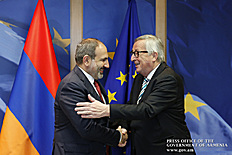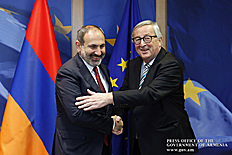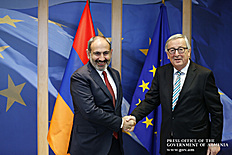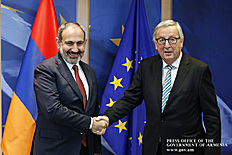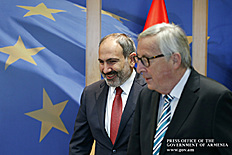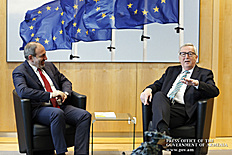Press releases
“The EU will continue supporting Armenian reforms under the More for More principle” - Armenian Prime Minister and the European Commission President discuss issues of bilateral agenda
more 3 photos
On March 5, Nikol Pashinyan met with European Commission President Jean-Claude Juncker in Brussels. The meeting was held in the Berlaymont building of the Commission. Welcoming Prime Minister Pashinyan to Brussels, Jean-Claude Juncker highlighted its importance in the context of the ongoing discussions on the process and prospects for EU-Armenia cooperation.
The President of the European Commission noted that the democratic reforms in Armenia are exciting and went on to reaffirm the European Union’s determination to continue providing Armenia with financial and advisory support under the More for More principle. As Jean-Claude Juncker pointed out, the EU will assist the Government of the Republic of Armenia in protecting and promoting human rights and fundamental reforms in a wide range of spheres.
Nikol Pashinyan thanked Jean-Claude Juncker for the warm welcome and his readiness to support our country. The Head of the Armenian Government noted that continued cooperation with the European Union is of crucial importance to Armenia, specifically in terms of economic development and the strengthening of democratic institutions.
The Prime Minister stressed that our country is going through drastic political and economic transformations, and the Armenian authorities are firmly determined to pursue the reforms aimed at strengthening the rule of law, protecting human rights and fundamental freedoms, developing democracy, combating corruption and creating a favorable business environment. Nikol Pashinyan underscored that the European Union has not set forth a precondition of geopolitical choice in the context of Armenia’s reform agenda, which will facilitate the Government’s cooperation with European structures.
Highlighting the high level of the ongoing EU-Armenia political dialogue, the parties discussed prospects for building ever closer partnership between the sides. In this context, they first stressed the importance of the EU-Armenia Comprehensive and Enhanced Partnership Agreement (CEPA) and the roadmap for its implementation, and went on to exchange views on ways to speed up the process of ratification by EU-member States.
Nikol Pashinyan and Jean-Claude Juncker next discussed issues related to infrastructure development and opportunities to expand cooperation in the energy sector. They exchanged views on possible cooperation in reforming the Electoral Code that will bring Armenia’s electoral processes into conformity with the highest international standards. The parties stressed the importance of developing economic cooperation between Armenia and EU-member States and underlined the steps taken to organize a business forum.
The Prime Minister of the Republic of Armenia and the President of the European Commission also discussed the process of visa liberalization, which is one of the priorities of bilateral cooperation. The parties stressed the need to start a dialogue to this end. Jean-Claude Juncker noted that visa liberalization will not only foster interstate and government-to-government cooperation, but will also help strengthen human ties, and therefore, the EU is ready to back this process.
Nikol Pashinyan and Jean-Claude Juncker next exchanged views on the Nagorno-Karabakh conflict settlement process. The Prime Minister expressed his gratitude for the EU’s balanced position in the settlement of the Nagorno-Karabakh conflict in tune with the position and efforts of the OSCE Minsk Group Co-Chairs. The interlocutors took the opportunity review the latest regional and international developments.
Following the meeting, the Armenian Prime Minister and the President of the European Commission made statements for mass media representatives summarizing the results of their talks, after which Prime Minister Pashinyan and EU Commissioner for European Neighborhood Policy and Enlargement Negotiations Johannes Hahn answered journalists’ questions.
